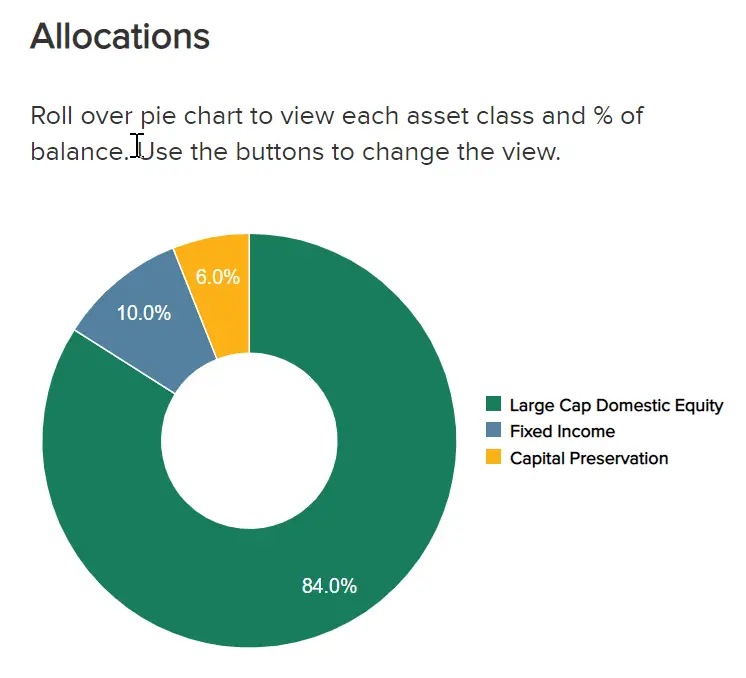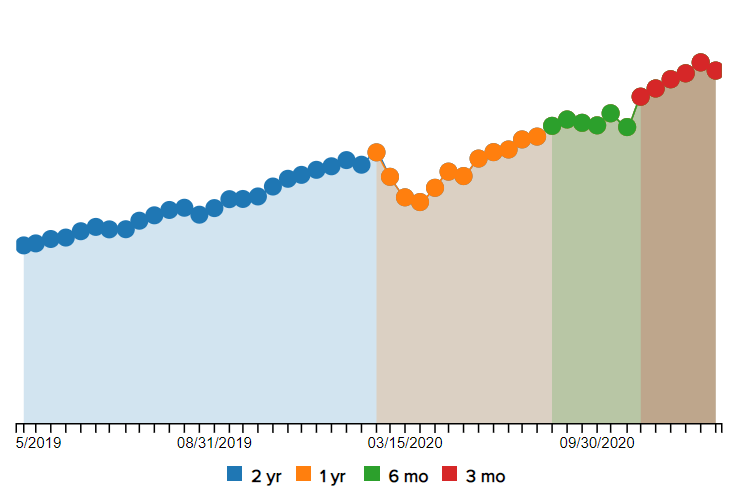Determining whether or not you have enough money for retirement is something that a lot of people contemplate on a daily basis. No matter if you are decades away from retirement or only a few years, financial retirement planning is important. Knowing that you can budget by paycheck and afford to live comfortably in retirement will bring you peace of mind. Additionally, you won’t have to stress about entering into retirement if you’re not financially ready.
There’s always a lot of talk about saving early for your retirement. And there are so many 401k advantages and disadvantages for employees saving. However, there’s not a lot of talk on the other side of the debate. What are the effects of retiring with no retirement funds available to live off of?
What if You Don’t Save for Retirement?
If you don’t save for retirement, you will have to make lifestyle sacrifices such as delaying retirement, working longer, or moving in with family. Additionally, if you are unable to delay your retirement and have to stop working for health reasons, you may be forced to live in an assisted living facility paid for by Medicaid.
While all of those choices could be considered the worst case scenario, there are other options not as drastic.
- Does financial freedom actually exist in retirement?
It can if you make the right choices. If you don’t save enough money for retirement, you might struggle with paying medical bills and prescriptions in retirement. Additionally, social security might not be enough to cover your everyday expenses and you might have to consider working in your retirement to make ends meet.
What Percentage of Adults Have No Retirement Savings?
It is no surprise that some retirees have no savings. There are a lot of reasons for the lack of savings among retirees. One of the main reasons retirees have no savings is that a lot of retirees were forced into retirement. A forced retirement can be a result of health problems or caring for a family member.
According to the Federal Reserve Report on Economic Well-being of US Households, 47% of retirees were forced into retirement to care for a family member or for health reasons. The Federal Reserve Report also stated that 25% of non-retirees have no retirement savings. Additionally, less than 40% of non-working adults feel they have saved enough for retirement.
For those non-retired adults that have self-directed retirement savings, 60% do not feel comfortable making investment elections and retirement decisions.
However, the main point is if you have no retirement savings you will need to decide if saving money or investing which is more important for you to grow your money and manage risk appropriately.
Retirement Income for Retirees
It’s important to save money for retirement if you plan to live a comfortable life in retirement. Knowing where your income will come from in retirement is also important to know because it can help you plan for your expenses.
Below is a chart based on the Federal Reserve report on household economic well-being noted above. The top sources of retirement income for retirees are below:
| Sources | Retirees 65+ | All Retirees |
|---|---|---|
| Social Security | 93% | 77% |
| Pension | 68% | 59% |
| Dividends, Real Estate Rents, Interest | 49% | 44% |
| Salaries, Wages, Self-Employment, Supplemental Employment | 25% | 32% |
| Cash Transactions (Non Social Security) | 4% | 8% |
As you can see the main source of income for retirees both above 65 years old and below 65 is Social Security followed by pension income. Both a pension and social security make up more than 50% for all retirees as the main source of retirement income for retirees.
Life Without Retirement Savings
A life without retirement savings for many is going to be a different retirement life. You might have envisioned a certain type of retirement lifestyle 30 years ago than what the financial realities of your retirement lifestyle are today with no retirement savings.
What happens if you don’t save for retirement is that you have no emergency fund to handle unexpected expenses. Life without retirement savings involves less freedom. If you don’t have any retirement savings, you won’t be able to spend income on thigs you want to do in your retirement life. This could include foregoing and travel while retired such as cruises or international travel.
Additionally, if you can’t afford to have your own place to live, you may end up living with family or living stingy which isn’t all that glamorous.
Consequences of Not Saving for Retirement
As you can see above, the majority of retirees have steady of income coming in through social security and pensions. That won’t be the case if you are going to retire within the next 10 to 20 years because most pensions have been eliminated for younger employees. Retirement plans will change in the future just like the future of money itself.
According to the Employee Benefit Research Institute, in 1979, 28% of private-sector workers had a defined benefit retirement plan. In 2014, only 2% of private-sector employees had a defined benefit retirement plan as stated by the nonprofit.
All of the risk that comes with investing in a market has been shifted from the employer to the employee. As such, if you happen to retire in a market downturn, your retirement dreams may become dashed with $100,000’s gone from your retirement portfolio.
It is clear that the younger workers of today will need to rely more on multiple sources of retirement income that generations past. Saving enough for retirement early while raising a family can be very challenging. However the consequences of delaying saving for retirement can be devastating.
What happens if you don’t save for retirement early on is that you will have to make up the loss of this money in your portfolio. Some of the consequences of not saving for retirement are below.
Working Longer
One of the most common consequences of not saving for retirement include working longer. If you don’t have anything saved for retirement, you will have to work longer. If you are living paycheck to paycheck, you won’t be able to retire because your bills will equal your full time income.
When you retire, your income will be reduced if you have no savings. Social Security won’t be equal to your income that you make while working full time. Therefore you will have to work longer to cover your expenses.
Living in Debt
A lot of people are forced into retirement due to health reasons. One of the consequences of not saving for retirement when you are forced into retirement is that you are living in debt immediately. If you have a forced retirement and your income falls all of a sudden, you could be living in debt in retirement.
When people plan for retirement, they try to address their expenses. However, when people are forced into retirement, they may not have addressed their current debt yet. No matter if the debt is outstanding balance vs principal balance loans, it has to be included. They may not have made changes or addressed their debt prior to retirement because they didn’t have time.
It is possible that they might have though they had 5 or 10 more years to address their debt, and then all of a sudden they find themselves in retirement. The result of that is a lifestyle of debt with less income to address it.
Less Freedom in Life
Another consequence of not saving for retirement is less freedom to do what you want in retirement. I mentioned this a bit up above but if you don’t have enough saved for retirement, you will have less choices and financial freedom available for you. You won’t be able to travel for example because chances are, you won’t have any extra income.
What happens if you don’t save for retirement is that you may be forced to live somewhere that you don’t want to live. You might not have freedom to choose where you want to live in retirement because of affordability. If you have not saved enough for retirement, you will have to make sacrifices in retirement.
Some of those sacrifices are not traveling or pursuing other adventures such as hobbies. The consequence of not saving for retirement is that you won’t be able to follow your dreams or pursue interests that you have. As a result you will have less freedom in your life in retirement.
Social Security Income Only
It may come as no surprise that if you have worked in the United States for a certain amount of time, you receive social security when you retire. Social security is a monthly payment from the US Government based on a formula from wages you earned during your lifetime.
What happens if you don’t save for retirement is that you will have to live in social security as your only income in retirement. Social security in general is not a lot of money. According to the social security benefit tables, the maximum benefits a person could receive in 2021 would be $46,740 a year if starting at age 70.
That’s not a lot of money if someone is still paying a mortgage, and has a lot of monthly expenses such as car payments. Additionally, in retirement you will also have more medical bills as well which will also eat into that income each month. However, a consequence of not saving for retirement is that you will have to rely on social security a your only monthly income.
Health Issues Due to Financial Stress
One consequence of not saving for retirement that often gets overlooked is your health. There is no question that a person’s health could suffer if they are forced into retirement and are not financially prepared for it. Dealing with financial stress an worry about how to pay your bills can keep anyone up at night.
If you lack an emergency fund or saving and are paycheck to paycheck, financial stress will catch up to you. Some of the health issues you could face might be anxiety, stress, high blood pressure, and heart disease.
What to Do if You Have No Retirement Savings
Planning for retirement is a lot of work. If you are nearing your retirement but have no retirement savings, don’t worry. There are things you can do to to minimize the negative financial impact in retirement.
No matter how far away you are from retirement age, you can always increase your retirement savings with proper planning. With proper planning, you can increase your savings for your retirement.
Below are some tips on what to do if you have no retirement savings:
Don’t Panic
The first thing you should do if you have no retirement savings is to remain calm and don’t panic. If you are only a few years away from retirement and don’t have any retirement savings, you can make changes immediately in your life that will yield some savings. You don’t have to live in fear if you don’t have anything saved for retirement because changes can be made in your life.
Continue Working
Another strategy if you have no retirement savings is to continue working for as long as possible. By continuing to work, you are increasing your earning history and work history. This helps increase your social security benefits when you do decide to retire. There are a lot of ways how to make $2,000 a month fast. Even if you are at the age of retirement you should continue to work if you are physically able to do so and delay retirement.
Increase Your Income
Another strategy to cope with not having any savings for retirement is to increase your income. Excellent ways to increase your income fast include working a sales job, working at jobs with stock options, or starting up a business.
There are a couple of ways you can increase your income and build your savings for retirement. One way is to leave your current job and work a higher paying job. There are all kinds of jobs such as welding jobs that pay 100k where you can skyrocket your income.
If switching jobs is out of the question, consider working an additional job. Starting a side business is a great way to increase your income and savings fast for retirement. In addition, there are also tax advantages for businesses. Businesses like starting a pooper scooper business are very popular.
You can also start an online business as well. There are many businesses that you can operate form your current house or even basement. One of the best businesses to consider is starting an online video game store to increase your income.
Look for Pension Jobs
While jobs offering a defined benefit pension plan are few and far between, they still do exist at some employment corporations. The best place to look for a pension job would be from the Federal Government. That’s right Uncle Sam still offers pensions to hires that seek employment with them.
Their pension plan is called Federal Employees Retirement System (FERS). The minimum amount of time for vesting in the federal government pension plans is 5 years. According to the tables on their website, if you are 62 years old and have at least 5 years of employment, you could receive benefits from FERS.
These are just some examples of what to do if you have no retirement savings. By focusing on continuing work and increasing your income you will be able to make income gains and increase your savings available for retirement. If you have more than 5 years available to work, consider looking for a job that offers a traditional defined benefit pension to help supplement your retirement income and social security.
Delay Your Retirement
If you don’t save for retirement, put together a plan to start saving. You can always put together a plan to start saving money for retirement. There are a lot of great strategies how to retire on 500k even if you are starting late in life to save. Consider delaying your retirement for a few years and start saving money. With a great retirement savings plan in place, you can start to put some money away for retirement.

A consequence of not saving money for retirement is to delay your retirement. However, this can be a blessing in disguise. A delay in starting your retirement gives you the luxury of extra time while still earning an income to pay things off such as your house and lower your expenses before retirement. When retirement starts, most of the time your income will be less than working full time.
How to Live in Retirement With No Money
Thinking about how to live in retirement with no money can be very stressful. A lot of people are paycheck to paycheck in retirement when it comes to their income in relation to their expenses. If you are worried about living your golden years paycheck to paycheck, rest assured because there are fixes. Luckily, there are things you can do now and in retirement to make living in retirement less stressful and more pleasing.
Below are some tips how to live in retirement with no money:
Delay Social Security
If you are able to delay your social security benefits, your checks will be larger when they start. Once you start drawing social security, your checks will only increase the cost of living amount each year. However, if you can delay until age 70 (depending when you were born) your checks could be an additional 30% or more higher than starting social security at the normal age.
Downsize Clutter
There comes a point when you will have to start lightening the load of your worldly possessions. If you have old appliances sitting around collecting dust now is the time to get rid of them. Maybe you are wondering where can I sell used appliances near me for cash? Rest assured, there are plenty of places that will take them.
Even organization can also save you money believe it or not. There is no question that getting organized will save you money if you take the time to purge and do it correctly.
Reduce Your Housing Costs
There is no question that housing is the most expensive monthly expense. One way to live in retirement with no money is to sell your house and move to a cheaper location. The savings from reducing your housing costs can be significant.
I recently sold my house and moved into a housing community. I went from paying $2,200 a month to $530 plus electric and reduced my housing costs by over 75% once you factor in maintenance and insurances as well. There are all kinds of senior housing cooperative communities located throughout the country. A majority of my neighbors are retired senior citizens.
Live on a Budget
If you are struggling to live in retirement with no money, you will need to create a monthly budget and adhere to it. While it might not be the glorious retirement you envisioned, at least you will be able to survive in retirement with the aid of a budget system.
Not being able to indulge in retirement can be hard for some. However, once your finances are in order, you should be able to get back on track and pursue your interests. Using budgeting tips and tricks can help improve your monthly finances.
Reduce Your Debt
To be successful living in retirement with no money, focus on reducing your monthly debt. If you are able to reduce your debt payments each month you will eventually have more disposable income as well each month. You can use debt tools such as a personal finance flowchart that will visually help determine which debts to pay off and when the best time is for payoff.
Eventually, you can also improve your credit because this will help with overall interest rates on the remaining debt you might have at higher interest rates. There are a lot of ways to repair your credit yourself that are simple and easy to do.
Live Frugally
One thing that happens If you don’t save for retirement is you will have a hard time supporting your lifestyle in retirement due to less income. One way how to live in retirement with no money is to practice frugal living strategies in retirement. While living this lifestyle may not be what you pictured for your retirement dream, it is a way to live in retirement with no money.
The less things you have to worry about the better your retirement life will be. You’ll be healthier and will be retired even if you have no money saved.
Live with Family
Living with family is a great way how to live in retirement with no money. You can either have family move in with you or you can move into their home. There are so many advantages to living with family in retirement when you have no retirement money saved.
Some of those advantages include you have help with paying housing costs, there is someone there to help you take care of your place, and if your need assistance with your health, you have family that could lend a hand if needed. Check out the best moving hacks to save money if you find yourself moving in with family.
Summary
A lot of people who approach retirement wonder what happens if you don’t save for retirement. It’s a very common thing to worry about as you approach retirement.
As you can see from above, some of the consequences of not saving for retirement are working longer, delaying retirement, and continue working while in retirement.
If you don’t save for retirement, you’ll have to learn how to live in retirement with no savings. Many people who enter retirement either by free choice or a forced retirement, can live a great retirement life even if they are paycheck to paycheck. Some of the ways how to live in retirement with no savings include downsizing housing, getting rid of possessions, living with family, budgeting and reducing debt.
If you have no savings and are retiring soon, using these tactics above can help you get the most out of your retirement even if you are light on finances to pay for your retirement lifestyle. Don’t delay. Review your retirement strategy as soon as possible.



